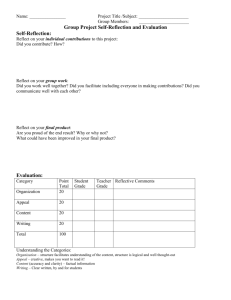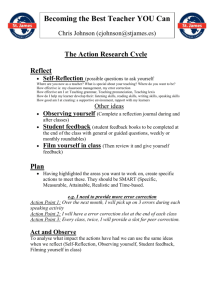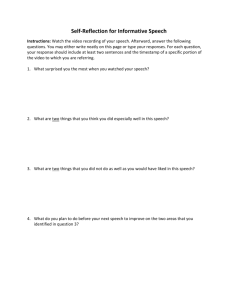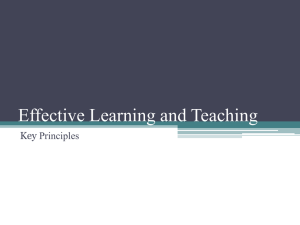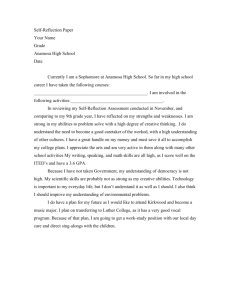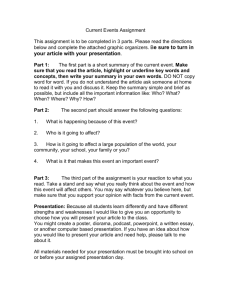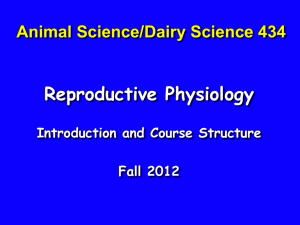e-Proceeding of the Global Conference on Technology in Language
advertisement
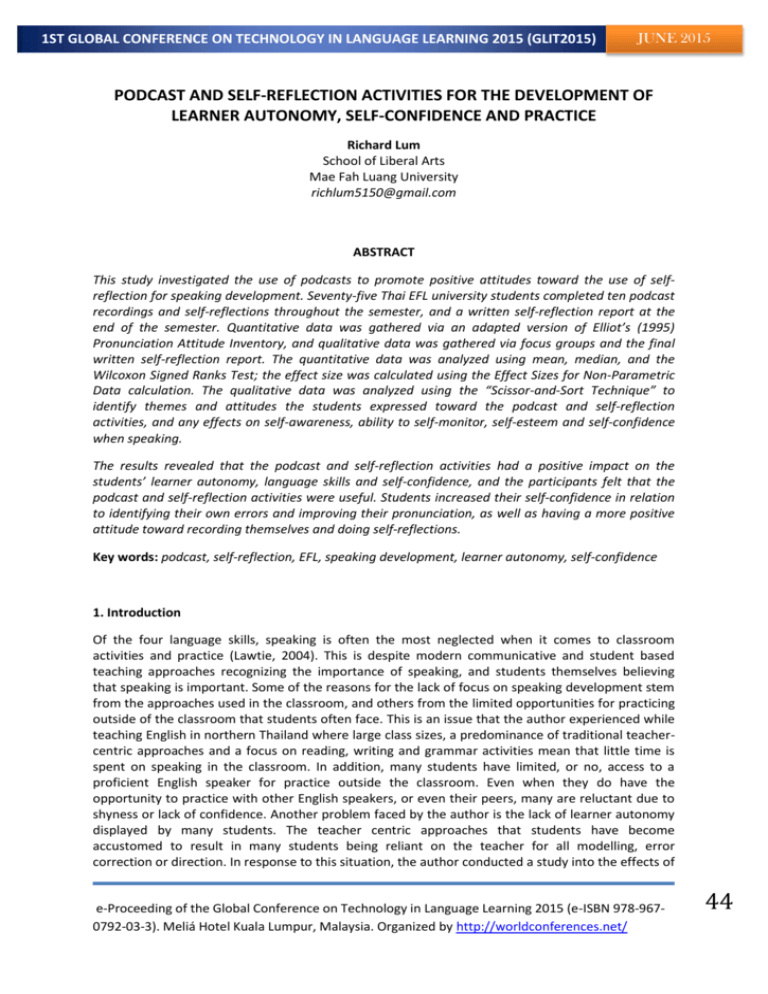
1ST GLOBAL CONFERENCE ON TECHNOLOGY IN LANGUAGE LEARNING 2015 (GLIT2015) JUNE 2015 PODCAST AND SELF-REFLECTION ACTIVITIES FOR THE DEVELOPMENT OF LEARNER AUTONOMY, SELF-CONFIDENCE AND PRACTICE Richard Lum School of Liberal Arts Mae Fah Luang University richlum5150@gmail.com ABSTRACT This study investigated the use of podcasts to promote positive attitudes toward the use of selfreflection for speaking development. Seventy-five Thai EFL university students completed ten podcast recordings and self-reflections throughout the semester, and a written self-reflection report at the end of the semester. Quantitative data was gathered via an adapted version of Elliot’s (1995) Pronunciation Attitude Inventory, and qualitative data was gathered via focus groups and the final written self-reflection report. The quantitative data was analyzed using mean, median, and the Wilcoxon Signed Ranks Test; the effect size was calculated using the Effect Sizes for Non-Parametric Data calculation. The qualitative data was analyzed using the “Scissor-and-Sort Technique” to identify themes and attitudes the students expressed toward the podcast and self-reflection activities, and any effects on self-awareness, ability to self-monitor, self-esteem and self-confidence when speaking. The results revealed that the podcast and self-reflection activities had a positive impact on the students’ learner autonomy, language skills and self-confidence, and the participants felt that the podcast and self-reflection activities were useful. Students increased their self-confidence in relation to identifying their own errors and improving their pronunciation, as well as having a more positive attitude toward recording themselves and doing self-reflections. Key words: podcast, self-reflection, EFL, speaking development, learner autonomy, self-confidence 1. Introduction Of the four language skills, speaking is often the most neglected when it comes to classroom activities and practice (Lawtie, 2004). This is despite modern communicative and student based teaching approaches recognizing the importance of speaking, and students themselves believing that speaking is important. Some of the reasons for the lack of focus on speaking development stem from the approaches used in the classroom, and others from the limited opportunities for practicing outside of the classroom that students often face. This is an issue that the author experienced while teaching English in northern Thailand where large class sizes, a predominance of traditional teachercentric approaches and a focus on reading, writing and grammar activities mean that little time is spent on speaking in the classroom. In addition, many students have limited, or no, access to a proficient English speaker for practice outside the classroom. Even when they do have the opportunity to practice with other English speakers, or even their peers, many are reluctant due to shyness or lack of confidence. Another problem faced by the author is the lack of learner autonomy displayed by many students. The teacher centric approaches that students have become accustomed to result in many students being reliant on the teacher for all modelling, error correction or direction. In response to this situation, the author conducted a study into the effects of e-Proceeding of the Global Conference on Technology in Language Learning 2015 (e-ISBN 978-9670792-03-3). Meliá Hotel Kuala Lumpur, Malaysia. Organized by http://worldconferences.net/ 44 1ST GLOBAL CONFERENCE ON TECHNOLOGY IN LANGUAGE LEARNING 2015 (GLIT2015) JUNE 2015 using podcasts and self-reflection activities with Thai EFL university students. A Constructivist approach was incorporated to promote learning through the use of podcasts and self-reflection activities that enable students to cognitively process and integrate new productive output with their existing knowledge. As part of a 2nd year Listening and Speaking course at a northern Thai university, students recorded 10 podcasts and did an online self-reflection of each podcast recording. They also completed a written self-reflection report at the end of the semester to reflect on the entire podcast project and their progress from the first to the last podcast. 2. Constructivist Theory Learning within a Constructivist approach is encouraged by creating an environment of cognitive dissonance that challenges the students, requiring them to utilize and examine their concepts and thinking processes (Vygotsky, 1978). It focuses on the way students learn, and aims to promote, not only the transmission of knowledge that traditional teaching methods favor, but the integration of learning with existing knowledge, so that students can internalize the learning and achieve a deeper understanding (Richardson, 1997, pp. 3-4). The teacher should act as a facilitator to provide an environment in which learners can discover and construct meaning and knowledge based on their own existing understanding and knowledge. There are four important aspects to Vygotsky’s Constructivist approach to learning: (1) learning is a social construct; (2) the Zone of Proximal Development (ZPD) which is the area just beyond the learner’s existing knowledge or ability; (3) the More Knowledge Other (MKO), which is a person or resource that the learner can use as a reference point or benchmark to learn from, compare themselves to and set goals; and (4) mediation, which refers to the fact that the learners have to intentionally interject themselves between themselves and the environment. At first glance, it may seem that the individual nature of recording a podcast and doing a selfreflection is inconsistent with the view that learning is a social activity. If, however, one takes a step back and considers the wider situation in which the student acquires a baseline of the target language through classroom activities and other inputs such a previous teachers, other English speakers they interact with and English television and films; it is through this socialization that many different examples and knowledge of English speaking blend to form the model of English speaking that each student has in their own mind. Each student can then apply that point of reference to their self-reflections of the podcasts. In the current study, students were challenged with the task of self-reflecting on their recorded podcast performance, comparing it to their own internal notion of the ideal goal, or target language, and thinking of how they can move toward that goal. They were essentially identifying their own ZPD. The process allowed students to determine what aspects of their language development needed their attention in order to progress from their current level to the next stage that they would like to be. Compared to more traditional teacher centric activities, in which the teacher is highly active and often the model, this approach has the advantage of being more personal for each student and specific to each student’s level and goals. The MKO for any individual is not just the current teacher, but an amalgamation of the models of English and understanding that the student has built up over time. The current teacher may carry more weight and be more influential, but there may also be previous experiences that individual students have had that are also very influential on the student's notion of the ideal speaking target. For example, one student may have a particular accent as their ideal model based on frequent interaction with a person, or exposure to certain speech in films. Another student may have had a previous teacher that stressed certain aspects of speaking and the student still views these as the e-Proceeding of the Global Conference on Technology in Language Learning 2015 (e-ISBN 978-9670792-03-3). Meliá Hotel Kuala Lumpur, Malaysia. Organized by http://worldconferences.net/ 45 1ST GLOBAL CONFERENCE ON TECHNOLOGY IN LANGUAGE LEARNING 2015 (GLIT2015) JUNE 2015 most important, or wishes to emulate the previous teacher. The MKO cannot be conceived as a single individual teacher interacting with the students in a vacuum devoid of any other social interaction or influence and creating a situation in which all students have the same notion of the MKO. The final key factor in Vygotsky's view of learning is mediation. Learning occurs when learners intentionally interject themselves between the environment and themselves. The podcast activities in this study provided a means by which students could mediate their environment. The combination of the podcasts and self-reflection activities allowed students to interject themselves into the speech act, review, analyze and modify it. It allowed for a delayed or slow motion mediation of a process that would normally require the student to speak, listen, assess and make decisions all in a very short amount of time in a real world context. These self-assessment activities can help to develop learner autonomy and responsibility for learning, as well as learners’ metacognitive awareness through critical thinking and an understanding and management of their cognitive processes (Salimi, Kargar, & Zareian, 2014), which is conducive to learning within a Constructivist approach. From this, we can see that the use of podcasts for self-reflection activities can be a useful tool within a Constructivist teaching approach. 3. Reflective Pronunciation Teaching Pronunciation teaching tends to focus on production as the main problem affecting learners, however, most research shows that the problem is more likely to be reception - what you don't hear, you can't say (Dalton, 1997). The traditional method of teaching pronunciation is for the teacher to model the correct pronunciation and then students, either individually or as a group, repeat back what they just heard. The teacher then provides immediate feedback on the accuracy of the pronunciation. This method focuses solely on production and does not require the students to make a critical assessment and analysis of their pronunciation. It is very teacher-centric, rather than student-centric. Reflective teaching techniques aim to develop learner autonomy; the ability for students to take control of and be responsible for their own learning. Zimmerman defined self-regulated, or autonomous, learners as being “aware when they know a fact or possess a skill and when they do not”, “actively seek out information when needed and take the necessary steps to master it”, and “accept greater responsibility for their achievement outcomes” (1990, p. 4). He also noted that selfregulated learners self-monitor and self-evaluate during the learning process so that they are metacognitively active participants in their own learning. One key aspect of learner autonomy is confidence, with a number of sources highlighting the importance of self-confidence and self-esteem in effective learners (Brown, 2007; Gass & Selinker, 2008; Saville-Troike, 2006), with Brown noting that “no successful cognitive or affective activity can be carried out without some degree of self-esteem, self-confidence, knowledge of yourself and selfefficacy – belief in your own capabilities to successfully perform that activity” (p. 154). In order to be autonomous, learners need the self-confidence to self-assess and then to decide on the appropriate course of action based on that self-assessment. When considering that high self-esteem translates to better academic performance (M. Liu & Huang, 2011; Macaskill & Denovan, 2013), it should be noted that self-esteem is not a fixed and constant phenomena, with Dias (2013) citing the example of students who have just graduated from high school to university experiencing a decrease in selfesteem (p. 112). This means that if we are able to reduce student anxiety and increase their confidence, we can increase student motivation and improve their English performance. e-Proceeding of the Global Conference on Technology in Language Learning 2015 (e-ISBN 978-9670792-03-3). Meliá Hotel Kuala Lumpur, Malaysia. Organized by http://worldconferences.net/ 46 1ST GLOBAL CONFERENCE ON TECHNOLOGY IN LANGUAGE LEARNING 2015 (GLIT2015) JUNE 2015 There is a need for pronunciation activities to move away from being teacher-centric to studentcentric communicative activities that include self-perception and self-correction to enable students to develop both listening and speaking skills (Hişmanoğlu, 2006). Vitanova and Miller (2002) asserted that “learners should be able to analyze their strengths and weaknesses, and have the strategies to transform themselves into confident speakers of English” (para. 22). Simply modelling the pronunciation and having students repeat back the sound does not equip them with the skills to perform this analysis and identify pronunciation problems. Similarly, Little (2005) stated that learner reflection and self-assessment is “key to the exercise and development of learner autonomy” (p. 2), and that this self-assessment helps the learner to develop essential metacognitive/metalinguistic skills. This suggests that a more student-centric approach, which provides students with the ability to self-monitor and assess, and reduces the reliance on the teacher, can be effective for the ongoing development of pronunciation skills. 4. Technology and Podcasts in Language Learning There are numerous studies that advocate the use of technology in the classroom. Today’s students are intrinsically motivated to use technology and the use of educational technology in L2 learning can provide additional opportunities for students to practice their language skills and enhance the learning experience (Mrozek, 2012), and enhance the learning experience by promoting ‘Active Learning’ that is more likely to achieve the desired learning outcomes (Cherney, 2008). Chen (2011) investigated the motivation and attitudes of EFL learners toward the implementation of technology in L2 classrooms and concluded that using technology and social experience can help language learners to improve their motivation to learn English as well as their activity engagement and course satisfaction. Within the Constructivist approach to learning, Kaya recently reviewed and highlighted a number of ways that technology can be used to “improve students’ communication skills, help them become active learners, and encourage them to reflect on their own learning” (2015, p. 3). In relation to podcast technology specifically, a number of studies have found that podcasts can be effective at developing speaking, promoting practice and improving student attitudes toward pronunciation (Ducate & Lomicka, 2009; Lord, 2008; Hunke, 2011; Saine, 2012). Of particular relevance to the problems faced by the author, podcasts can provide opportunities for students to actively practice their language skills in environments where English is not frequently heard or spoken (Hunke, 2011), and can be beneficial for shy or inhibited learners (Ivy 2011; Tavales & Skevoulis, 2006). Ivy also makes the point that podcasting can be very motivating, especially if students are aware of and audience that will be listening to their performance. It can provide some meaning, or context, to a speaking task. Podcasts provide the opportunity for learner reflection and self-assessment, which Little (2005) notes is important for pronunciation development and the development of learner autonomy, and that this self-assessment helps the learner to develop essential metacognitive/metalinguistic skills. In regard to the use of technology for reflective teaching activities, Miller (2013) concluded that the use of podcasts for self-reflection were effective at developing metacognitive awareness in students, enabling them to notice and correct their mistakes more easily. The use of technology in language learning is still relatively new and is constantly developing and changing with many new technologies, and uses for these technologies, emerging all of the time. Whilst technology should not be used in language teaching simply for the sake of using technology, it is evident that teachers should be aware of the technological options that they have available, and the potential uses of them. The use of podcast recordings and self-reflection activities e-Proceeding of the Global Conference on Technology in Language Learning 2015 (e-ISBN 978-9670792-03-3). Meliá Hotel Kuala Lumpur, Malaysia. Organized by http://worldconferences.net/ 47 1ST GLOBAL CONFERENCE ON TECHNOLOGY IN LANGUAGE LEARNING 2015 (GLIT2015) JUNE 2015 may be useful at enabling students to engage in quality practice outside of the classroom. 5. Methodology 5.1 Sample and data collection method The participants in this study were 75 second year university students in northern Thailand, comprised of 15 males and 60 females between 18 and 21 years old. All are native Thai speakers studying to be English teachers in Thailand. They were convenience sampled from the second year Speaking and Listening course within which the podcasting project was conducted. Twenty students were randomly selected to participate in focus groups at the end of the project. 5.2 Instrumentation This study used a mixed methodology. Quantitative data was obtained using an adapted version of Elliott’s (1995) Pronunciation Attitude Inventory (PAI) that used a 5 point Likert scale to measure attitudes to pronunciation, attitudes to the self-reflection activities, attitudes to the use of podcasts for self-reflection, and attitudes toward the continued use of self-reflection as a learning strategy after completing the study. In order to gain a more detailed insight into the attitude of the students, qualitative data was obtained via focus groups and an analysis of the written self-reflection of the podcast project that each student completed at the end of the semester. 5.3 Procedure and Data Collection All participants completed the PAI at the beginning of the semester before the doing the first podcast and self-reflection activity. Over the course of one semester, students were required to complete 5 podcast topics. For each podcast topic, each student performed the following steps: 1. Record themselves performing the assigned task and upload it to their Soundcloud account. 2. Do a self-reflection on their podcast by posting a comment under their podcast. 3. 1 week later, review the podcast and self-reflection and then re-record the podcast task. 4. Listen to their 2nd attempt and reflect on it. Focusing on areas that they have improved and areas that still require improvement. Each podcast topic took two weeks to complete and ten recordings were made in total. Student’s podcasts were recorded and uploaded to www.soundcloud.com. This podcast site allowed students to make comments on each podcast at specific points in the audio file, as well as general, non-time stamped comments. These podcasts were recorded in the students own time outside of class. Each student was then required to do a self-reflection and comment on each recording. Each podcast topic was an extension of the material covered in class during the course and designed to promote the use of the target language learnt in class. As an example, after a lesson on past simple tense, the podcast activity required students to talk about what they did on the weekend, which required them to use past simple tense correctly. After the final podcast, students reviewed all of their recordings and wrote a written report reflecting on the progress they had made and on the actual podcast and self-reflection activities. e-Proceeding of the Global Conference on Technology in Language Learning 2015 (e-ISBN 978-9670792-03-3). Meliá Hotel Kuala Lumpur, Malaysia. Organized by http://worldconferences.net/ 48 JUNE 2015 1ST GLOBAL CONFERENCE ON TECHNOLOGY IN LANGUAGE LEARNING 2015 (GLIT2015) Upon completing the final podcast and self-reflection report, the PAI was administered a second time and responses were analyzed to determine the students’ attitudes toward the podcast activities and any effect the activities may have had on students’ speaking skills, self-analysis and practice time. In addition to the quantitative data gathered from the PAI survey, twenty students were randomly selected to participate in focus groups in order to gain a more detailed insight into their attitudes and the usefulness of the podcast and self-reflection activities. 6. Findings & Discussion 6.1 Data analysis Data from all items on the PAI survey was not normally distributed, so each item was analyzed using the Wilcoxon Signed Ranks Test to compare the survey responses, and the effect size was calculated using the Effect Sizes for Non-Parametric Data calculation (Fritz, Morris, & Richler, 2012, p. 12) to determine the strength of association and the amount of variance in the matched-pairs tests. The four focus groups were transcribed and then analyzed in conjunction with the written selfreflection reports using the “Scissor-and-Sort Technique” (Stewart, Shamdasani, & Rook, 2007, p. 116) of qualitative data analysis. The focus group and written self-reflection data were analyzed to identify any themes and attitudes the students expressed toward the podcast activities or the selfreflection activities, as well as any changes to students’ self-awareness and ability to self-monitor, their self-esteem and self-confidence when speaking, and any aspect of the podcast activities or selfreflection activities that the students found particularly useful or effective.. 6.2 Descriptive statistics & analysis The quantitative data revealed in increase in student attitudes in 7 of the 16 items from the pretreatment to post-treatment survey. Table 1: Changes in student attitudes Increased attitude toward … Z p r the importance of proper pronunciation -2.846 .004 .34 the belief that they can improve their pronunciation skills -2.376 .018 .28 the importance of sounding like a native speaker -2.257 .024 .27 the belief in their ability to identify their own pronunciation errors -2.897 .004 .34 recording themselves to practice speaking -5.895 .000 .70 the usefulness of listening to their own speaking and doing self- -3.423 reflections .001 .41 the usefulness of recording and listening to themselves to improve -2.161 their pronunciation .031 .26 The qualitative analysis of the focus groups and the written self-reflection reports revealed seven common and recurring themes that were mentioned by the students. At a high level, the themes could be split into two broad categories: the usefulness, or positive aspects, of the podcast and self- e-Proceeding of the Global Conference on Technology in Language Learning 2015 (e-ISBN 978-9670792-03-3). Meliá Hotel Kuala Lumpur, Malaysia. Organized by http://worldconferences.net/ 49 1ST GLOBAL CONFERENCE ON TECHNOLOGY IN LANGUAGE LEARNING 2015 (GLIT2015) JUNE 2015 reflection activities; and the problems, or negative aspects, of the podcasts and self-reflection activities. The data relating to the problems and negative aspects of the podcast and self-reflection activities was then be broken down into three discrete themes of 1) technical, 2) student-related, and 3) activity-related. The data relating to the usefulness and positive aspects of the podcast and self-reflection activities can be broken down into four discrete themes of 1) language/skills development, 2) self-confidence, 3) learner autonomy (the ability to identify own mistakes, practice, future use of the activities), and 4) other (benefits and knowledge from researching podcast topics, differences between the experience of recording themselves speaking and speaking in class, and future applications of the podcast and self-reflection activities for work). This is summarized in Table 2. Table 2: Main Themes Identified from Focus Groups and Written Self-Reflection Reports Problems/negative aspects Technical Student related Count % Useful/positive aspects Activity related Learner autonomy Language/skills development Selfconfidence Other 6 29 21 108 101 41 28 1.80% 8.68% 6.29% 32.34% 30.24% 12.28% 8.38% The technical problems related to difficulties students had setting up their Soundcloud account or recording their first podcast. No students had any technical problems after the initial podcast. Student related problems were in regard to students reporting that they felt nervous, excited, worried or scared before doing their first podcast. Most of these students, however, made subsequent comments that indicted that this was only a problem for the initial podcast and that they felt more comfortable once they were familiar with the process. The negative attitudes that students had toward the activities included not liking the self-reflection activities and wanting the teacher to provide feedback on each podcast. Students did not like the self-reflection activities because they did not think they could identify their errors, or that they could not express themselves in writing. This suggests that for some lower level students some more guidance may be required or it may be an option to allow students to write their self-reflection in their L1. In regard to students wanting the teacher to provide feedback instead of doing self-reflections, this is contrary to one of the main aims of the project, to develop learner autonomy, self-awareness and promoting practice outside of the classroom without being dependent on the teacher. The most common positive comments from the focus groups and written self-reflection reports related to learner autonomy with students noting that the self-reflection activities helped them to identify their own speaking errors, prompted them to look up the meaning and pronunciation of new vocabulary in the dictionary, and were an effective tool for them to practice outside of the classroom. Students noted that they would continue to record themselves and do self-reflections in the future, although perhaps not every week as required in the course. The focus groups and written self-reflection reports indicated that the podcast and self-reflection activities were useful in providing a framework for students to practice outside of the class as well as enabling them to selfmonitor and self-assess their language. In addition, students recognized that continuing to record themselves and do self-reflections was something that they could continue to do once the course had finished, thus providing an ongoing benefit and framework for students to continue to develop their language skills autonomously in the future. e-Proceeding of the Global Conference on Technology in Language Learning 2015 (e-ISBN 978-9670792-03-3). Meliá Hotel Kuala Lumpur, Malaysia. Organized by http://worldconferences.net/ 50 1ST GLOBAL CONFERENCE ON TECHNOLOGY IN LANGUAGE LEARNING 2015 (GLIT2015) JUNE 2015 Another area that students made positive comments on was in regard to the usefulness of the podcast and self-reflection activities for the development of their language skills. Students noted that not only were the podcast and self-reflection activities a good way for them to practice and selfassess, as outlined above, but that they were able to perceive an improvement in their language skills that they attributed to doing the podcast and self-reflection activities. It is interesting to note that students felt that the podcast and self-reflection activities improved not only their speaking and listening skills, which were the focus of activities, but also their writing, reading and vocabulary due to the preparation that they put into researching some of the podcast topics and then preparing what they would say. The third most common positive comments made by students in the focus groups and written selfreflection reports related to the positive effect that the podcast and self-reflection activities had on their self-confidence, not only when recording their podcasts, but when speaking in class or talking to other people. 7. Conclusion and Future Recommendation Overall, the podcast and self-reflection activities had a positive impact on students’ learner autonomy, language skills and self-confidence, with very few minor negative issues as reported above. Examples of learner autonomy included the students’ ability to self-monitor and identify their own errors and increased opportunities to practice outside of the classroom. The development of these aspects reduces the reliance on the teacher for language development and empowers the student to take more control and responsibility of their practice and development. This learner autonomy also extends beyond the duration of the study with students reporting that they intend to continue to record themselves and do self-reflections on their speaking in the future. One important aspect in regard to practice is the quality of practice enabled by the podcast and self-reflection activities. Speaking practice for students may often involve them repeating an activity that they did in class, with the notion that simply speaking the words constitutes practice. There may not be any cognitive processing or analysis on the part of the student, apart from aiming to speak the whole passage. The self-reflection activities, however, extend practice beyond the mere speaking task, providing a framework for the students to cognitively process, analyze and reference back to their existing knowledge. Students reported improvements in all four language skills and vocabulary. The impact on their speaking and listening skills was not too surprising as that was the primary focus of the activities. However, students also reported improvements in reading, writing and vocabulary, which were unexpected. Students cited the preparation they put into researching podcast topics and preparing what they would say as beneficial to their reading, writing and vocabulary. What is perhaps of most significance, in relation to the language skill development, is that the students could perceive the improvements in their language skills themselves through listening to their recordings and doing the self-reflections. This affirmation contributes to the attitude toward the usefulness of the activities and also to increases in student self-confidence. The increased self-confidence was able to be transferred to situations other than just speaking for the podcast recordings. Students reported being more confident in the speaking ability and less shy when speaking in class or in face-to-face interactions. e-Proceeding of the Global Conference on Technology in Language Learning 2015 (e-ISBN 978-9670792-03-3). Meliá Hotel Kuala Lumpur, Malaysia. Organized by http://worldconferences.net/ 51 1ST GLOBAL CONFERENCE ON TECHNOLOGY IN LANGUAGE LEARNING 2015 (GLIT2015) JUNE 2015 This study provides support for Kaya’s (2015) view that technology can be effective in a Constructivist learning approach in which students can develop their communication skills, be more active learners and reflect on their own learning. In particular, podcast and self-reflection activities can be useful for language development, developing learner autonomy, self-confidence and promoting practice outside the classroom. The author also noted that students are less shy when speaking and the qualitative data contained examples where students are not afraid to speak, even though they know they are not perfect. Despite their less than ideal grammar and pronunciation, students are still able to effectively communicate. Something that would not be possible if they remained too shy to even try to speak. The study is also consistent with Abhakorn’s (2014) finding that self-reflection activities can be beneficial to Thai EFL student contexts, extending the applicability to university level Thai EFL students and focusing more specifically on speaking skill development. In addition, students reported that they experienced a different state of mind when speaking for their podcasts compared to speaking in class or a face-to-face situation. This provides support for the use of the podcast activities to address the issue identified by Çakır and Baytar (2014) that university level EFL students often have a high affective filter that causes them to be shy or anxious when practicing their speaking in class or with others. One might argue that this detracts from the usefulness of the activities and that they should be avoided as they do not accurately reflect real world situations. However, it should be noted that students reported that they now feel more confident and less shy when speaking to people in real world situations and that they are able to speak and listen to them more effectively. So, it would appear that practice in this altered state can develop skills that are transferable to real world situations. It also needs to be born in mind that one of the motivations for the activities in this study was the fact that students in Northern Thailand have limited opportunities to practice their speaking skills in real world situations outside of the classroom. One of the challenges for language teachers is to increase the amount of time that students spend practicing, and the students in this study reported that the podcast and self-reflection activities increased the amount of time they spent practicing. Some students mentioned specific classmates whose podcasts they listened to and self-reflections they read, as they thought that these students had good speaking skills and they were interested in their peers’ self-reflections. They used these classmates as an example or a guideline and would compare their own recordings to the classmates that they believed to be better than themselves. This highlights the potential for the podcast activities to be used to promote peer-awareness and peer-reflection as a supplement to the self-monitoring and self-reflection that was the focus of this study. For any future projects using podcasts and self-reflections, one should be cognizant of the initial apprehension and technical issues some students faced and try to mitigate this as much as possible in the initial briefing session. The podcast and self-reflection activities used in this study can be used to develop students’ language skills, increase self-confidence, develop learner autonomy and provide structured practice outside of the classroom. In the connected, online world in which we now live, EFL students have access to, and are often more comfortable with, the technology required to do these activities; this is something that teachers must capitalize on. e-Proceeding of the Global Conference on Technology in Language Learning 2015 (e-ISBN 978-9670792-03-3). Meliá Hotel Kuala Lumpur, Malaysia. Organized by http://worldconferences.net/ 52 1ST GLOBAL CONFERENCE ON TECHNOLOGY IN LANGUAGE LEARNING 2015 (GLIT2015) JUNE 2015 References Abhakorn, M. L. J. (2014). Investigating the Use of Student Portfolios to Develop Students' Metacognition in English as a Foreign Language Learning. Journal of Language Teaching and Research, 5(1), 46-55. Brown, H. D. (2007). Principles of Language Learning and Teaching (5th ed.). New York: Pearson. Çakır, İ., & Baytar, B. (2014). Foreign language learners’ views on the importance of learning the target language pronunciation. Journal of Language and Linguistic Studies, 10(1), 99-110. Chen, Y. (2011). The Influence of Integrating Technology in Language Learning Courses. (Doctoral Dissertation), University of Kansas. Retrieved from http://kuscholarworks.ku.edu/dspace/bitstream/1808/8053/1/Chen_ku_0099D_11442_DATA_1.pdf Cherney, I. D. (2008). The effects of active learning on students' memories for course content. Active Learning in Higher Education, 9(2), 152-171. Dalton, D. F. (1997). Some Techniques For Teaching Pronunciation. The Internet TESL Journal, III(1). Retrieved from http://iteslj.org/Techniques/Dalton-Pronunciation.html Dias, A. (2013). The Correlation between the Writing Ability and Self-esteem of Surabaya Merchant Marine Academy Students. Beyond Words, 1(1), 110-136. Ducate, L., & Lomicka, L. (2009). Podcasting: An Effective Tool for Honing Language Students’ Pronunciation? Language Learning & Technology, 13(3), 66-86. Elliott, A. R. (1995). Field Independence/Dependence, Hemispheric Specialization, and Attitude in Relation to Pronunciation Accuracy in Spanish as a Foreign Language. The Modern Language Journal, 79(iii), 369-371. Gass, S. M., & Selinker, L. (2008). Second Language Acquisition: And introductory course (3rd ed.). New York: Routledge. Hişmanoğlu, M. (2006). Current perspectives on pronunciation learning and teaching. Journal of Language and Linguistic Studies, II(1), 101-110. Hunke, M. (2011). What's that noise? Audio applications for improving pronunciation and fluency Foreign Language Learning and Teaching Places: Schools, Universities and Others (pp. 25-40). Matsuyama: Rudolph Reinelt Research Laboratory EU. Ivy, T. I. (2011). Technology and the Language Teacher. The Arts Faculty Journal, 206-223. Retrieved from http://www.banglajol.info/index.php/AFJ/article/viewFile/12942/9306 Kaya, H. (2015). Blending technology with Constructivism: Implications for an ELT classroom. Teaching English with Technology, 15(1), 3-13. Lawtie, F. (2004). Teaching speaking skills 2 - overcoming classroom problems. British Council. Retrieved from http://www.teachingenglish.org.uk/articles/teaching-speaking-skills-2-overcoming- e-Proceeding of the Global Conference on Technology in Language Learning 2015 (e-ISBN 978-9670792-03-3). Meliá Hotel Kuala Lumpur, Malaysia. Organized by http://worldconferences.net/ 53 1ST GLOBAL CONFERENCE ON TECHNOLOGY IN LANGUAGE LEARNING 2015 (GLIT2015) JUNE 2015 classroom-problems Little, D. (2005). The European Language Portfolio: where pedagogy and testing meet. ALTE – The Association of Language Testers in Europe. Retrieved from http://www.alte.org/further_info/cardiff/dl_1105.pdf Liu, C. H., & Matthews, R. (2005). Vygotsky’s philosophy: Constructivism and its criticisms examined. International Education Journal, 6(3), 386-399. Liu, M., & Huang, W. (2011). An Exploration of Foreign Language Anxiety and English Learning Motivation. Education Research International, 2011. doi:10.1155/2011/493167 Lord, G. (2008). Podcasting Communities and Second Language Pronunciation. Foreign Language Annals, 41(2), 374-389. Macaskill, A., & Denovan, A. (2013). Developing autonomous learning in first year university students using perspectives from positive psychology. Studies in Higher Education, 38(1), 124-142. Miller, J. S. (2013). Improving oral proficiency by raising metacognitive awareness with recordings. In J. Levis & K. LeVelle (Eds.), Proceedings of the 4th Pronunciation in Second Language Learning and Teaching Conference (pp. 101-111). Ames, IA: Iowa State University. Mrozek, B. L. (2012). A Proposed Model for Technology/Language Acquisition Application in the Spanish Classroom. Senior Honors Thesis. Retrieved from http://commons.emich.edu/honors/318 Richardson, V. (1997). Constructivist Teaching and Teacher Education: Theory and Practice. In V. Richardson (Ed.), Constructivist Teacher Education: Building a World of New Understandings (pp. 314). London: Routledge. Saine, P. (2012). iPods, iPads, and the SMARTBoard: Transforming literacy instruction and student learning. The NERA Journal, 47(2), 74-79. Salimi, M., Kargar, A. A., & Zareian, A. (2014). Self-Assessment of Pronunciation and its Impact on EFL Learners' Pronunciation Ability. International Journal of Language Learning and Applied Linguistics World, 6(4), 605-622. Saville-Troike, M. (2006). Introducing Second Language Acquisition. New York: Cambridge University Press. Smith, A. F., & Strong, G. (Eds.). (2009). Adult Language Learners: Context and Innovation. Alexandria, VA: TESOL Publications. Tavales, S., & Skevoulis, S. (2006). Podcasts: changing the face of e-learning. Paper presented at the Proceedings of the 2006 International Conference on e-Learning, e-Business, Enterprise Information Systems, e-Government, and Outsourcing, Las Vegas. Vitanova, G., & Miller, A. (2002). Reflective Practice in Pronunciation Learning. The Internet TESL Journal, VIII(1). Retrieved from http://iteslj.org/Articles/Vitanova-Pronunciation.html e-Proceeding of the Global Conference on Technology in Language Learning 2015 (e-ISBN 978-9670792-03-3). Meliá Hotel Kuala Lumpur, Malaysia. Organized by http://worldconferences.net/ 54 1ST GLOBAL CONFERENCE ON TECHNOLOGY IN LANGUAGE LEARNING 2015 (GLIT2015) JUNE 2015 Vygotsky, L. S. (1978). Mind in society: The development of higher mental processes (M. Cole, V. John-Steiner, S. Scribner & E. Souberman Eds.). Cambridge, MA: Harvard University Press. Zimmerman, B. J. (1990). Self-Regulated Learning and Academic Achievement: An Overview. Educational Psychologist, 25(1), 3-17. e-Proceeding of the Global Conference on Technology in Language Learning 2015 (e-ISBN 978-9670792-03-3). Meliá Hotel Kuala Lumpur, Malaysia. Organized by http://worldconferences.net/ 55
